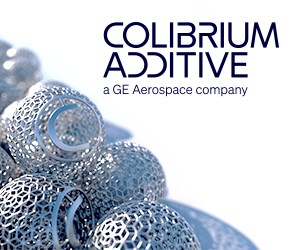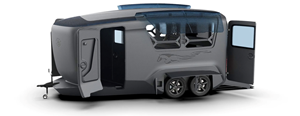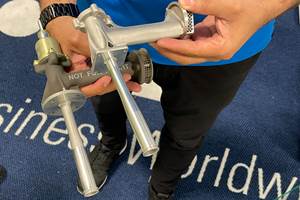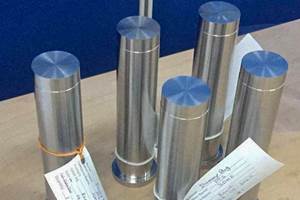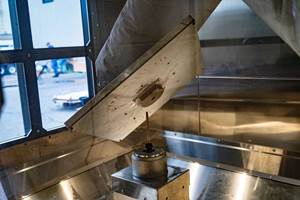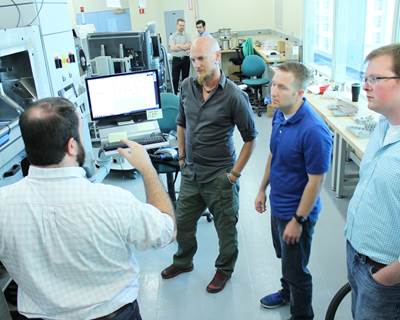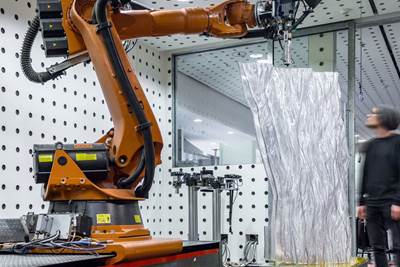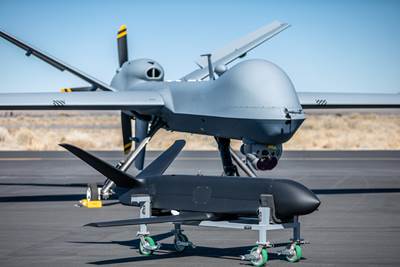Solukon Names US Distribution Partners
Solukon’s distribution partners in the U.S. include DMARK Corp., Hartwig, MAHAR, Phillips Corp. and BahFed.
Share
A joystick used with SFM-AT-1000-S enables operators to move part in any desired position. Photo Credit: Solukon
Solukon is now cooperating with five U.S. distribution partners to further strengthen its position in the U.S. market and offer its U.S. customers a local contact. The partners include DMARK Corp., Hartwig, MAHAR, Phillips Corp. and BahFed.
Since the introduction of Solukon’s SPR (Smart Powder Recuperation) depowdering technology in 2015, the company has been a market leader in industrial depowdering in additive manufacturing (AM). To strengthen its market position, Solukon has already created distribution partnerships in Europe (Benelux, UK), Asia-Pacific (Korea, Australia) and Canada in the past one-and-a-half years. Now, strategic partnerships with five U.S. companies follow, with sales partnerships divided by area.
In the western US., Solukon is now represented by DMARK Corp. The company, based in Los Alamitos, California, now serves Solukon customers and prospects in the states of Washington, Oregon, California, Nevada and Arizona. Since 1987, DMARK has been providing manufacturers with the CNC machine tools and AM equipment.
For the states in the middle U.S., Solukon is partnering with Hartwig Inc. The contractual area Hartwig covers includes the entire geographic area of Idaho, Utah, Montana, Wyoming, Colorado, New Mexico, North Dakota, South Dakota, Nebraska, Kansas, Oklahoma, Texas, Minnesota, Iowa, Missouri, Louisiana and Illinois. Hartwig is the Midwest’s largest machine tool distributor based in St. Louis, Missouri. Since the company’s founding in 1960, the Hartwig team has installed more than 12,000 machine tools for its customers. Hartwig is known for its manufacturing solutions and support of turning, milling, grinding, EDM and AM. In the field of AM, Hartwig already partners with EOS with whom Solukon also has a strong partnership.
The distribution area of MAHAR Tool Supply Co. includes the states Wisconsin, Michigan, Indiana, Ohio, Kentucky and Mississippi. Since 1947, MAHAR has been a full-service tooling support partner, providing solutions for its customers from industries such as automotive, medical or energy. MAHAR’s programs range from basic traditional supply to full commodity management programs. In addition to the U.S. states, MAHAR will also be the Solukon agent for Mexico, Costa Rica and Puerto Rico.
The Northeast and Southeast U.S. will be covered by additive and machining expert Phillips Corp. The company distributes Solukon machines in Maine, New Hampshire, Vermont, New York, Massachusetts, Connecticut, Pennsylvania, New Jersey, Delaware, Maryland, West Virginia, Virginia, Tennessee, North Carolina, South Carolina, Alabama, Georgia and Florida.
Nationwide, Solukon is partnering with Portland-based BahFed Corp to supply federal, state and local government customers with Solukon depowdering stations. BahFed holds several GSA Schedules and is a NASA SEWP V contract holder, enabling the company to serve government agencies and organizations throughout the United States.
All U.S. Solukon distribution partners will report to Michael Sattler, Solukon’s global sales director who is also responsible for the global reseller network. “As pioneer and market leader in depowdering, it is important to us that customers and prospects receive the best possible consulting service wherever they are located in the world,” Sattler says. “Partnering with DMARK, Hartwig, MAHAR, Phillips and BahFed will not only eliminate the time shift effects but gives every U.S. prospect a regional depowdering contact person nearby.”
- Learn about Solukon’s distribution partnership with URMA. URMA is working with Solukon on the automated depowdering of metal parts.
- Read about Solukon expanding the compatibility of unpacking, cleaning station for plastic parts. With adapters for EOS P 1 and P 5 series SLS manufacturing systems, the Solukon SFP770 postprocessing system can now accommodate build boxes from other leading printers, enabling Solukon to tap new markets in the area of polymer postprocessing.
Related Content
Next-Gen Horse Trailers to Be Built With Robotic 3D Printing
Double D Trailers is currently developing a prototype horse trailer that will be made with large-format additive manufacturing. The technology brings potential benefits for labor, weight and design features to this subset of recreational vehicles.
Read MoreQualification Today, Better Aircraft Tomorrow — Eaton’s Additive Manufacturing Strategy
The case for additive has been made, Eaton says. Now, the company is taking on qualification costs so it can convert aircraft parts made through casting to AM. The investment today will speed qualification of the 3D printed parts of the future, allowing design engineers to fully explore additive’s freedoms.
Read MoreConocoPhillips Sees Oil and Gas Supply Chain Opportunity With Additive Manufacturing
Production of parts when needed and where needed can respond to the oil and gas sector’s multibillion-dollar challenge of holding parts in inventory. The supply chain benefit will justify additive even before the design freedoms are explored.
Read MoreThe Cold Spray Solution to the Casting, Forging Supply Chains
Startup HAMR Industries performs additive manufacturing work at Neighborhood 91 that provides an alternative to traditional casting and forging. Success so far has led to redefining the limits of its additive equipment.
Read MoreRead Next
4 Ways the Education and Training Challenge Is Different for Additive Manufacturing
The advance of additive manufacturing means we need more professionals educated in AM technology.
Read More3D Printing Brings Sustainability, Accessibility to Glass Manufacturing
Australian startup Maple Glass Printing has developed a process for extruding glass into artwork, lab implements and architectural elements. Along the way, the company has also found more efficient ways of recycling this material.
Read MoreAt General Atomics, Do Unmanned Aerial Systems Reveal the Future of Aircraft Manufacturing?
The maker of the Predator and SkyGuardian remote aircraft can implement additive manufacturing more rapidly and widely than the makers of other types of planes. The role of 3D printing in current and future UAS components hints at how far AM can go to save cost and time in aircraft production and design.
Read More

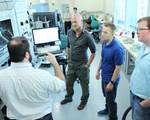



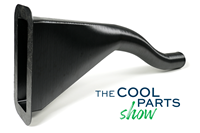

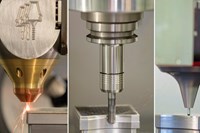

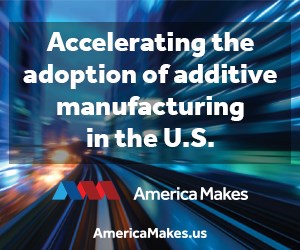
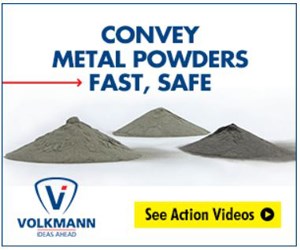
.png;maxWidth=300;quality=90)

